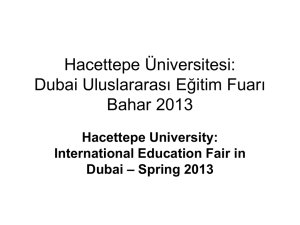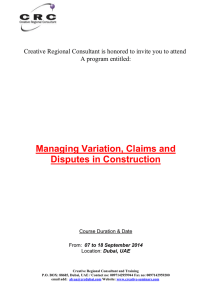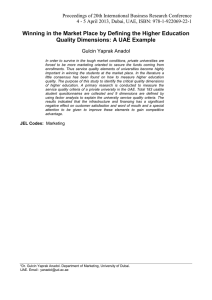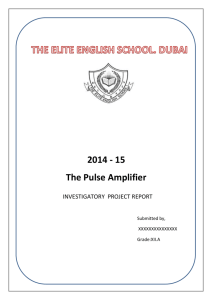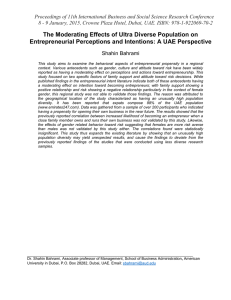ESTABLISHING A BUSINESS PRESENCE IN DUBAI
advertisement
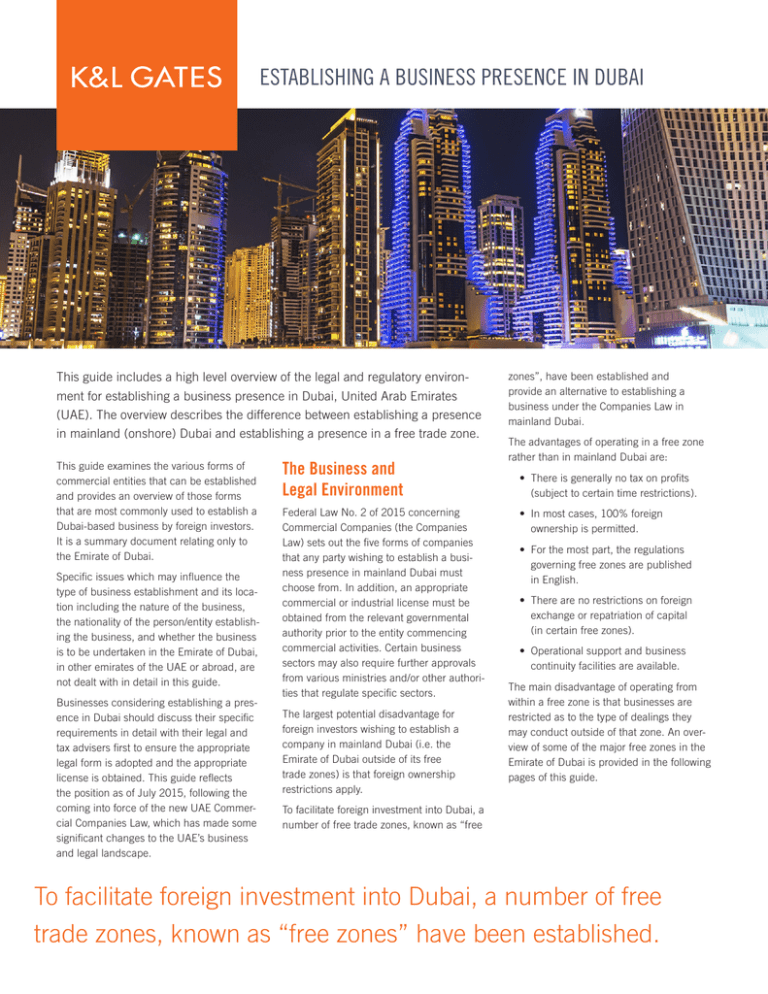
ESTABLISHING A BUSINESS PRESENCE IN DUBAI This guide includes a high level overview of the legal and regulatory environment for establishing a business presence in Dubai, United Arab Emirates (UAE). The overview describes the difference between establishing a presence in mainland (onshore) Dubai and establishing a presence in a free trade zone. This guide examines the various forms of commercial entities that can be established and provides an overview of those forms that are most commonly used to establish a Dubai-based business by foreign investors. It is a summary document relating only to the Emirate of Dubai. Specific issues which may influence the type of business establishment and its location including the nature of the business, the nationality of the person/entity establishing the business, and whether the business is to be undertaken in the Emirate of Dubai, in other emirates of the UAE or abroad, are not dealt with in detail in this guide. Businesses considering establishing a presence in Dubai should discuss their specific requirements in detail with their legal and tax advisers first to ensure the appropriate legal form is adopted and the appropriate license is obtained. This guide reflects the position as of July 2015, following the coming into force of the new UAE Commercial Companies Law, which has made some significant changes to the UAE’s business and legal landscape. The Business and Legal Environment Federal Law No. 2 of 2015 concerning Commercial Companies (the Companies Law) sets out the five forms of companies that any party wishing to establish a business presence in mainland Dubai must choose from. In addition, an appropriate commercial or industrial license must be obtained from the relevant governmental authority prior to the entity commencing commercial activities. Certain business sectors may also require further approvals from various ministries and/or other authorities that regulate specific sectors. The largest potential disadvantage for foreign investors wishing to establish a company in mainland Dubai (i.e. the Emirate of Dubai outside of its free trade zones) is that foreign ownership restrictions apply. zones”, have been established and provide an alternative to establishing a business under the Companies Law in mainland Dubai. The advantages of operating in a free zone rather than in mainland Dubai are: •There is generally no tax on profits (subject to certain time restrictions). •In most cases, 100% foreign ownership is permitted. •For the most part, the regulations governing free zones are published in English. •There are no restrictions on foreign exchange or repatriation of capital (in certain free zones). •Operational support and business continuity facilities are available. The main disadvantage of operating from within a free zone is that businesses are restricted as to the type of dealings they may conduct outside of that zone. An overview of some of the major free zones in the Emirate of Dubai is provided in the following pages of this guide. To facilitate foreign investment into Dubai, a number of free trade zones, known as “free To facilitate foreign investment into Dubai, a number of free trade zones, known as “free zones” have been established. Establishing a Business Presence in Mainland (Onshore) Dubai The Companies Law applies to all companies, branch offices, and representative offices of foreign companies established and operating in mainland Dubai (i.e. outside the free zones). The five forms of companies permitted by the Companies Law are: FIVE forms of companies permitted by the COMPANIES LAW 1 Limited liability company 2 Public joint-stock company 3 Private joint-stock company 4 P artnership company (general partnership) 5 Limited partnership company (simple liability partnership) 1.Limited liability company 2.Public joint-stock company 3.Private joint-stock company 4.Partnership company (general partnership) 5.Limited partnership company (simple liability partnership) Limited Liability Companies, Public Joint Stock Companies and Private Joint Stock Companies are the most commonly established types of legal entities in the UAE and are by extension the most commonly used or invested in by foreign investors. An overview of each of the three forms is provided below. The other two entities are not commonly used in the UAE for several reasons, including restrictions on foreign ownership and foreign management. Alternatively, a foreign business can carry out certain activities in Dubai through a representative office or a branch of a foreign company as will be further explained in this guide. Non-commercial activities (including professional services) may be carried out through a civil company or a sole proprietorship, which both have unlimited liability. Limited Liability Company The limited liability company (LLC) is the most widely used form of company by foreign investors wishing to conduct commercial activities in Dubai. An LLC is a private company and its shares cannot be offered to the public. Shareholders of an LLC benefit from limited liability status. An LLC has a separate legal capacity that is independent of its shareholders. The liability of each shareholder to the other shareholders and to third parties is limited to such shareholder’s capital contribution to the LLC. The objects of an LLC must not include insurance, banking, or investment of funds for the account of third parties. An LLC must have an initial capital sufficient for it to achieve its objectives, and the founders of an LLC have the right to determine the amount of such initial capital. An LLC is required to have at least 51% of its shares held by UAE nationals. An LLC may however have 100% of its share capital owned by Gulf Cooperation Council (GCC) nationals (namely citizens of Bahrain, Kuwait, Oman, Qatar, Saudi Arabia and the UAE), but if any non-GCC national becomes a shareholder in the LLC, the minimum 51% UAE national ownership must be complied with. Historically a practice of entering into certain side agreements has developed in the UAE in relation to the UAE national ownership requirements. Pursuant to such side agreements, UAE shareholders agree to assign their profits to the foreign shareholders in an LLC in return for an agreed annual fixed fee. The enforceability of such side agreements is not certain, and the prudent view is that a UAE court might consider such side agreements an attempt to circumvent UAE ownership requirements in breach of the UAE Companies Law and UAE Federal Law No. 17 of 2004 concerning the Combating of Commercial Concealment, as amended (the UAE AntiFronting Law) which technically entered into force on 31 December 2009. The Anti-Fronting Law prohibits and criminalizes the practice of enabling a non-UAE national to conduct an economic or professional activity which is prohibited or restricted by UAE laws and regulations. The Companies Law, however, permits shareholders of an LLC to agree on a disproportionate economic benefit split that deviates from their shareholding ratio. This means that profits and losses of an LLC may be distributed disproportionately among the shareholders (including where the shareholders include both UAE and non-UAE nationals). The ratio should be set out in the LLC’s memorandum and articles of association provided that not less than 20% of profits are distributed to the UAE national shareholders. The management of an LLC may be comprised of either a single director or a board of directors. Generally, there are no nationality requirements regarding the composition of the board. Specific conditions may be required for forming an LLC in mainland Dubai. These conditions depend on the nature of activities to be conducted by the company. It should be noted that certain activities will be restricted to those companies that are fully owned by UAE nationals or GCC nationals. In most cases, the licensing and registration procedures of an LLC will entail, amongst other things, (i) obtaining a trade name reservation certificate and an initial approval from the Dubai Department of Economic Development; (ii) executing and notarizing the memorandum of association of the company before the notary public; (iii) obtaining a commercial or an industrial license and a registration certificate from the Dubai Department of Economic Development; and (iv) obtaining a membership certificate from the Dubai Chamber of Commerce & Industry. Each of these steps will require the shareholders to submit certain documents and to carry out certain procedures. Additional approvals from other local or federal authorities may be required before obtaining a license from the Dubai Department of Economic Development, depending on the nature of the activities that are to be carried out by the company. Public Joint-Stock Company Public joint stock companies are required to have at least five founding members (unless founded by the UAE federal government or the government of one of the seven Emirates that make up the UAE or unless it is the result of a conversion of any company into a public joint stock company), and an initial capital commitment of AED30 million (approximately US$8.2 million). The articles of association of the company may provide for an authorized share capital, which may be up to two times the issued share capital of the company. The capital of a UAE public joint stock company is required to be divided into negotiable shares of equal value. The nominal value of each share must not be less than AED1 (approximately US$0.27) or exceed AED100 (approximately US$27). All of the company’s shares must have equal rights and must be subject to equal obligations. Part paid shares are permitted, provided that at least 25% of their value is paid upon their issue and the remainder of their nominal value is paid up within three years of such issue. Between 30% and 70% of shares must be offered to the public. With the exception of shares in public joint stock companies which are wholly owned by the UAE federal government or the government of one of the Emirates, shares in all public joint stock companies must be listed on a securities market in the UAE (the Dubai Financial Market or the Abu Dhabi Securities Exchange). A public joint stock company has a separate legal capacity independent of its shareholders. Like LLCs, 51% of the share capital of public joint stock companies must at all times be held by UAE nationals. GCC ownership will satisfy the UAE ownership requirements in public joint stock companies, although the articles and memorandum of association of a particular public joint stock company are capable of providing otherwise. A public joint stock company is required to have an odd number of directors, which may be between three and 11; each director is elected for a term of three years and may be re-elected for further 3-year terms. The chairman and a majority of the board of directors must be UAE nationals. At least two thirds of the directors must be shareholders of the company. A public joint stock company cannot provide financial assistance to any shareholder. Private Joint-Stock Company A private joint stock company requires at least two founding members and a minimum initial capital commitment of AED5 million. As an exception to the rule, the law permits the incorporation of sole shareholder private joint stock companies, known as ‘sole proprietorship - private joint stock” entities. A private joint stock company may not have more than 200 shareholders. Shares in private joint stock companies may not be offered for public subscription. In all other respects, provisions of the Companies Law applicable to a public joint stock company also apply to a private joint stock company. A private joint stock company may be converted into a public joint stock company. Private joint-stock companies with more than 75 shareholders must comply with corporate governance rules which will be issued pursuant to a Ministerial Resolution. Branch (or Representative Office) of a Foreign Company Foreign companies are permitted to establish wholly owned branches and representative offices in Dubai. The primary difference between a branch office and a representative office is that a branch office may carry out activities similar to those of its parent company and to generate revenue in the UAE. In contrast, a representative office may only promote its foreign parent company’s activities by gathering information and soliciting orders but may not carry on its parent company’s activities. There are also restrictions on the number of employees the representative office can sponsor. The scope of activities that may be carried out through a branch of a foreign company are limited to those activities permitted by the UAE Ministry of Economy from time to time, which has traditionally excluded trading activities of goods and products in addition to certain other service activities. A branch or a representative office is not considered to be a separate legal entity from its parent company. The liabilities of a branch or representative office therefore attach to the foreign parent company establishing it. Generally, foreign companies must appoint a local service agent as a requirement for licensing and registration of a branch or a representative office in the UAE. The local service agent must be a UAE national or a company wholly owned by UAE nationals. Unlike a shareholder, a local service agent has no equity or management interest in the branch office or the representative office and does not bear any of its liabilities or obligations. The compensation of a local service agent is typically an annual fee stipulated in an agreement (the Local Service Agency Agreement) between the local service agent and the foreign company, in consideration for certain administrative and licensing assistance that the local service agent may perform for the branch office or the representative office. The licensing and registration of a branch or a representative office of a foreign company in Dubai requires the following steps: (i) obtaining a trade name reservation certificate and an initial approval from the Dubai Department of Economic Development; (ii) obtaining an initial approval from the Ministry of Economy; (iii) executing and notarizing the Local Service Agency Agreement; (iv) obtaining a commercial, a professional, or an industrial license and a registration certificate from the Dubai Department of Economic Development; (v) obtaining a certificate of registration of the foreign company in the register of foreign companies maintained by the UAE Ministry of Economy; and (vi) obtaining a membership certificate from the Dubai Chamber of Commerce & Industry. Additional approvals (external approvals) from other authorities may be required before obtaining a license and a registration certificate from the Dubai Department of Economic Development, depending on the nature of activities to be carried out by the branch. In general, annual fees will be due to the relevant authorities for the renewal of licenses and certificates of registration (in addition to the one-time establishment fees paid at the outset). There will also be other incidental fees relating to the issue and maintenance of immigration, labour and residency permits. In addition, office space needs to be leased within mainland Dubai in order for a license to be issued by the Dubai Department of Economic Development to any entity operating in mainland Dubai. As noted above, it will invariably be necessary to engage a local service agent or a local equity partner when establishing a business presence in mainland Dubai. The level of involvement of such local service agent or partner will depend on the type of the entity to be established. The Free Zones Over 20 free zones have been established in Dubai, each with its own individual industry focus and regulatory environment. Businesses operating in the free zones are not subject to many of the restrictions imposed by federal and local laws and regulations. The following are some of the more well known free zones established in Dubai: • Jebel Ali Free Zone (JAFZ) Located next to the largest port in the Middle East, JAFZ is primarily targeted at import and export businesses. • Dubai International Financial Centre (DIFC) Primarily for financial services providers. The DIFC has its own legal system, courts, financial services regulator (the Dubai Financial Services Authority), and stock exchange (NASDAQ Dubai). The type of business activity to be undertaken will dictate which free zone is appropriate in light of both commercial and regulatory considerations. Further information on these and other free zones can be provided on request. • Dubai Technology and Media Free Zone Principally for business activities that are related to information technology, e-commerce, media, printing and publishing, media production, broadcasting, information agencies, training and education. This free zone acts as an umbrella to a number of smaller and more specialized free zones such as Dubai Media City, Dubai Internet City, Dubai Knowledge Village, Dubai Media Production Zone, Dubai Studio City, and Dubai Outsource zone. Establishing a Business Presence in the Free Zones • Dubai Health Care City Provides quality healthcare and an integrated center for clinical and wellness services, medical education and research. • Dubai Multi Commodities Centre (DMCC) A commodity market place, providing industry specific market infrastructure and a full range of facilities for the gold and precious metals, diamonds and colored stones, energy, and other commodities industries. DMCC is also home to a general free zone for noncommodities related business that has become increasingly popular in recent years. • Dubai Airport Free Zone (DAFZ) A general trading, import and export free zone located next to Dubai International Airport. • Dubai Silicon Oasis (DSO) A high-tech free zone for the microelectronics and the semiconductor industries, amongst other IT and technology sectors. • Dubai Logistics City (part of Dubai World Central) A logistics-oriented free zone catering to all transport modes, logistics businesses, and value added services, including light manufacturing and assembly located near Dubai’s new airport (Al Maktoum International Airport). The free zones operate independently of each other and each has its own Free Zone Authority (FZA), responsible for issuing the necessary licenses for operating in its respective free zone. As each free zone is different, it will be necessary to liaise closely with the relevant FZA in order to determine its particular requirements. An individual or entity wishing to operate in a free zone will need to establish an operating entity to carry out its business in the free zone. The type of legal entity that may be established differs from free zone to free zone. Broadly, however, the following are the most common types of entities that may be established in the free zones: • Free Zone Establishment (FZE) An FZE may have only one shareholder and holds separate legal capacity from its shareholder. • Free Zone Company (FZCO or FZ-LLC) A FZCO or FZ-LLC is very similar to an FZE with a separate legal capacity independent of its shareholders. However, in contrast to an FZE, it may have more than one shareholder. • A branch office of a foreign or local company A branch office of a foreign or local company is not considered to be a separate legal entity from its parent. The liabilities of a branch of a foreign or local company attach to the parent company establishing the branch office. •A Limited Liability Company in the DIFC (LLC) An LLC holds separate legal capacity and it may have one or more shareholders. There is no minimum capital requirement for the establishment of an LLC. The capital of an LLC is divided into interests, each of which may be of a different value and class. Such interests may not be represented by shares. • A company limited by shares in the DIFC (Ltd) A company limited by shares holds separate legal capacity from its shareholders and may have one or more shareholders. There is no applicable minimum capital requirement. The capital of the company is divided into transferable shares. • An offshore company in JAFZ An offshore company may have one or more shareholders and holds separate legal capacity from its shareholders. An offshore company cannot carry on business with companies or individuals resident in the UAE, and no residency permit or any kind of visas can be issued to an offshore company. There is no minimum capital requirement for the establishment of an offshore company. While it is not required that an offshore company maintains a physical existence or office in JAFZ or Dubai, it is permitted to do so. It is also permitted to maintain a bank account in Dubai (inside or outside the free zone). An offshore company is required to appoint a registered agent approved by the free zone authority. Setting up a free zone branch is likely to be the simplest option to establish a business presence in a free zone, although consideration should be given to the desirability of ring fencing liability within a new company with limited liability. As noted above, depending on the particular free zone, there are minimum capital requirements for incorporating free zone establishments and companies. The types of license that will be granted by the relevant free zones authorities will depend on the type of industry serviced by the free zone. The licenses include trade licenses, industrial licenses, retail licenses, service licenses, warehousing licenses, and professional service licenses. ABOUT K&L GATES Annual fees will be due to the relevant FZA for these licenses together with a one-off set up fee. There will be other incidental fees relating to immigration and, of course, an annual rental payment for office or industrial space. These licensing fees are subject to change by the relevant authority and will be dependent on the free zone and the type of license applied for. A discussion with the relevant FZA regarding the type of license required and any applicable fees should be held at the outset. K&L Gates’ Dubai office is located in the Dubai International Financial Centre. The office advises local and international corporations active in the United Arab Emirates and throughout the Middle East, North Africa and South Asia, with particular emphasis on corporate and commercial transactions, mergers and acquisitions, investment funds, financial services regulatory advice, banking and finance, infrastructure projects, construction; dispute resolution including arbitration. Finally The lawyers in our Dubai office have considerable experience and industry connections and can also leverage the proven capabilities of their colleagues based in Doha, Qatar and throughout the firm’s extensive network of offices. With strong presence in key capital cities and world commercial and financial centers, our global network of legal resources allows us to offer strategic counsel on a variety of issues around the world. Please contact us directly for more information on how we may be able to assist you or your business. Businesses considering establishing a presence in Dubai should discuss their specific requirements in detail with their legal and tax advisers first to ensure that the appropriate structure is adopted and licenses obtained. The structure to be used by a business seeking to establish in Dubai is dependent on a number of legal, licensing, and tax considerations, and the level and location of the business that is likely to be transacted in the region. The above is only a brief summary of the key considerations. We are happy to provide more specific advice on request. K&L Gates delivers legal services on an integrated and global basis, with lawyers located across the Middle East, Asia, Australia, Europe, South America, and the United States. Learn more about our Dubai business practice at klgates.com. Contacts: 12431 Owen Waft Partner, Dubai owen.waft@klgates.com +971.4.427.2714 Anchorage Austin Fort Worth Frankfurt Orange County Beijing Harrisburg Palo Alto Paris Berlin Boston Hong Kong Perth Brisbane Houston Pittsburgh Brussels London Portland Charleston Los Angeles Raleigh Charlotte Melbourne Miami Research Triangle Park Chicago Milan Dallas Moscow San Francisco Doha Newark São Paulo Dubai New York Seattle Seoul Shanghai Singapore Spokane Sydney Taipei Tokyo Warsaw Washington, D.C. Wilmington K&L Gates comprises approximately 2,000 lawyers globally who practice in fully integrated offices located on five continents. The firm represents leading multinational corporations, growth and middle-market companies, capital markets participants and entrepreneurs in every major industry group as well as public sector entities, educational institutions, philanthropic organizations and individuals. For more information about K&L Gates or its locations, practices and registrations, visit klgates.com. This publication is for informational purposes and does not contain or convey legal advice. The information herein should not be used or relied upon in regard to any particular facts or circumstances without first consulting a lawyer. ©2015 K&L Gates LLP. All Rights Reserved.
